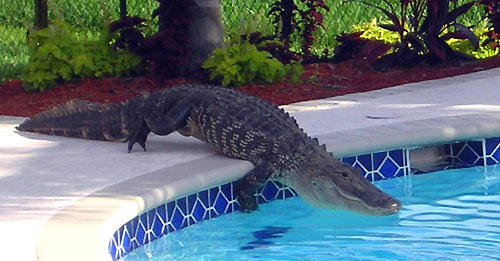It’s a pool owner’s worst nightmare. You head outside on a hot day for a refreshing dip in your pool and there is an unwanted visitor making his home in the crystal-clear water. An alligator in your pool can be traumatizing, especially if you have children or pets that play in your backyard area. Why would a gator decide to take a dip in your pool anyway? Alligators are popular in Florida, Texas and the South, and often move from one body of water to another. Perhaps your pool was just one stop on his way? He may have been looking for food or new territory. Either way, the first thing to do is contact Fish & Wildlife or an alligator trapping service to remove the animal. What happens next?
Is your pool going to be out of commission for days on end? Do you have to drain it? Fortunately, the Center for Disease Control says that most wild animals that enter pools “do not pose a health risk to swimmers.”1 The chlorine is strong enough to eliminate any germs that an animal may bring into the water. Additionally, most of the germs that they carry only affect other animals.
The CDC recommends that you raise the free chlorine concentration to, or maintain it at, 2 parts per million (ppm); maintain the pH levels at 7.5 or less and keep the temperature at 77°F (25°C) or higher. The free chlorine and pH should remain at these levels for 30 minutes. This will ensure that no contaminants remain. If you want to be sure that your pool returns to form, you can use a product such as Natural Pool Enzyme. These products contain natural enzymes that break down organic and non-living unwanted material and can be used with any filter or surface type.
 2
2
Stopping Animals from Getting in your Pool
The best way to stop alligators (or any other unwanted creature) from entering your pool is to create a barrier. A fence can help, but a screen enclosure will prevent most small animals, rodents and birds from entering your pool. This keeps the animals away from the chemicals in the pool and helps keep your family safe from disease and injury from wildlife. A pool cover or leaf net will help to keep smaller creatures like frogs out and is cheaper than a screen.
Even if you find a dead animal in your pool, the chemicals should keep you safe from dangerous bacteria. However, there is one animal that can cause significant problems with your pool and threaten your safety. Raccoons can carry a hazardous worm that causes severe neurologic illness. If a raccoon has been in your pool, you need to follow the instructions in this raccoon clean-up article to get it cleaned thoroughly. So, whether it’s a gator, goose or groundhog, there’s no need to worry when animals come for a dip in your pool.
Just be sure to keep your pool in balance and follow the ABC’s of Pool Care.
1 "Finding a Dead Animal in the Pool.” Centers for Disease Control and Prevention. July 6, 2017. https://www.cdc.gov/healthywater/swimming/residential/animals/dead-animals-and-pools.html
2 " Are Alligators Too Close For Your Comfort in Sunny Florida?" ActiveRain.com. Katerina Gasset. April 27, 2018. http://activerain.com/blogsview/219527/are-alligators-too-close-for-your-comfort-in-sunny-florida--
Video Courtesy of Sarasota County Sherriff's Office, March 31 2018. https://twitter.com/SarasotaSheriff/status/979992686030741505
Share This Post

